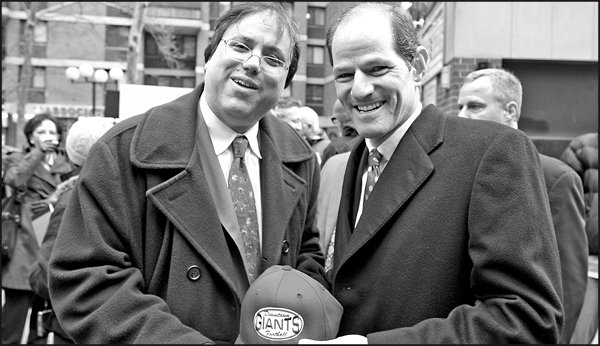By Josh Rogers
One-word answers are not Alan Gerson’s forte.
Gerson, Lower Manhattan’s councilmember, often speaks at length to community groups, expanding on bullet points to his ideas with even more bullet points.
On Saturday, The New York Times reported all 51 New York City councilmembers’ positions on the congestion-pricing proposal and Gerson was listed as being against. Last summer Gotham Gazette, a city news site, surveyed the City Council on Mayor Mike Bloomberg’s original traffic-pricing plan and Gerson was again listed as an opponent. Both times, Gerson said he was listed incorrectly.
Gerson’s position on the idea to charge drivers $8 to enter Downtown or Midtown on weekdays from 6 a.m. to 6 p.m. has remained consistent in several interviews with Downtown Express this year and last, but his views can be hard to translate to a figurative check-off box on a reporter’s poll question. Gerson, who is for the pricing idea but is hoping for adjustments, is trying to negotiate changes to the plan and when pressed, he makes sure he doesn’t say he backs it as written.
“It’s hard to talk about these things when things are fluid, but I want to let people know what’s going on” he said.
Charles Komanoff, a longtime congestion-pricing advocate who lives in Gerson’s district, said he was angry to read Gerson was the only Manhattan councilmember listed as an opponent in the Times story.
“Any defection by a Manhattan councilmember is taken as red meat by the opponents,” said Komanoff, adding the March 31 deadline for federal funds for congestion pricing does not give much time for adjustments.
Komanoff, a Tribeca resident and past president of Transportation Alternatives, a cycling and pedestrian advocacy group, has conducted numerous studies on traffic and safety, and said Lower Manhattan would be a clear beneficiary with less traffic and almost $500 million a year for mass transportation in the New York area.
“If Downtown electeds can’t see that the vast majority of their constituents will be made better off by congestion pricing, then we have a profound failure of political leadership,” he said.
The two other Downtown councilmembers, Council Speaker Christine Quinn and Councilmember Rosie Mendez, are both largely in favor of the current plan. But Downtown state legislators have expressed only qualified support or high levels of skepticism. If the City Council votes in favor, the plan would move to Albany, where it must pass by March 31 for New York to collect $354 million in federal funds to implement the proposal. Opposition in the State Assembly is high and passage in the City Council is far from certain.
The Times, which asked councilmembers if they would vote for the plan if it came to a vote today, counted 12 in favor, 20 opposed and 11 undecided among those who commented. Gerson said he would look to postpone the vote if it came to that and thought “undecided” was closer to his position.
Ray Rivera, who wrote the Times article, said he has no argument with what Gerson says he believes, but the councilmember was clear that he would not vote in favor if it had come to a vote that day.
“He was clear the current plan was in need of several changes and those changes were substantial,” Rivera said in a telephone interview.
Gerson said as long as there is a “commitment to a process” to make adjustments, he could end up supporting the current plan.
“If you don’t make some of these changes, you’re going to make a bad situation worse,” he said. Although, he later clarified that he was not certain passing the plan without changes would worsen traffic.
He said traffic problems on Canal St. and at other Downtown locations are also very bad after 6 p.m. on weekdays and on weekends and if drivers wait to go into the city to avoid the fees it would exacerbate that problem. He’s doubtful the estimated average 6.8 percent reduction in traffic below 60th St. will be that high on Canal St., where Holland Tunnel drivers will be able to deduct their $8 tolls off the entire congestion fee, thus paying no extra fee. Gerson said even if the estimate that each new commuter bus will mean 20 fewer cars is accurate, the buses still could add more pollution and noise to Downtown unless there is a bus management plan.
Komanoff, a longtime Gerson supporter, nevertheless said, “You have to twist yourself into a mental pretzel to come up with a way in which the congestion-pricing plan would make things worse for Lower Manhattan.”
Komanoff thinks Gerson and other Downtown representatives should have led the effort to get the initiative passed and should have worked to educate skeptics in other parts of the city and state. The overwhelming majority of Downtown workers commute by mass transit, according to several studies.
“There is not an Assembly district, a Senate district, a Council district with more than 5 percent of the households now commuting regularly into the heart of Manhattan,” said Komanoff.
Gerson said Komanoff is a “brilliant and outstanding advocate, but he does not have his pulse on the Council because he’s not there.”
Gerson said he can negotiate improvements to the plan with the Mayor’s Office and help rally support in the Council at the same time. He thinks the city will pass a good congestion-pricing plan before it’s too late to send it to Albany.
“I’m hopeful the Council will collectively reach an agreement,” Gerson said.
He thinks the news survey disputes are probably because of the complicated nature of the issues and not a reflection of how he did in school on multiple-choice compared to essay tests.
“I did well on both types of tests,” he recalled.
Josh@DowntownExpress.com


































